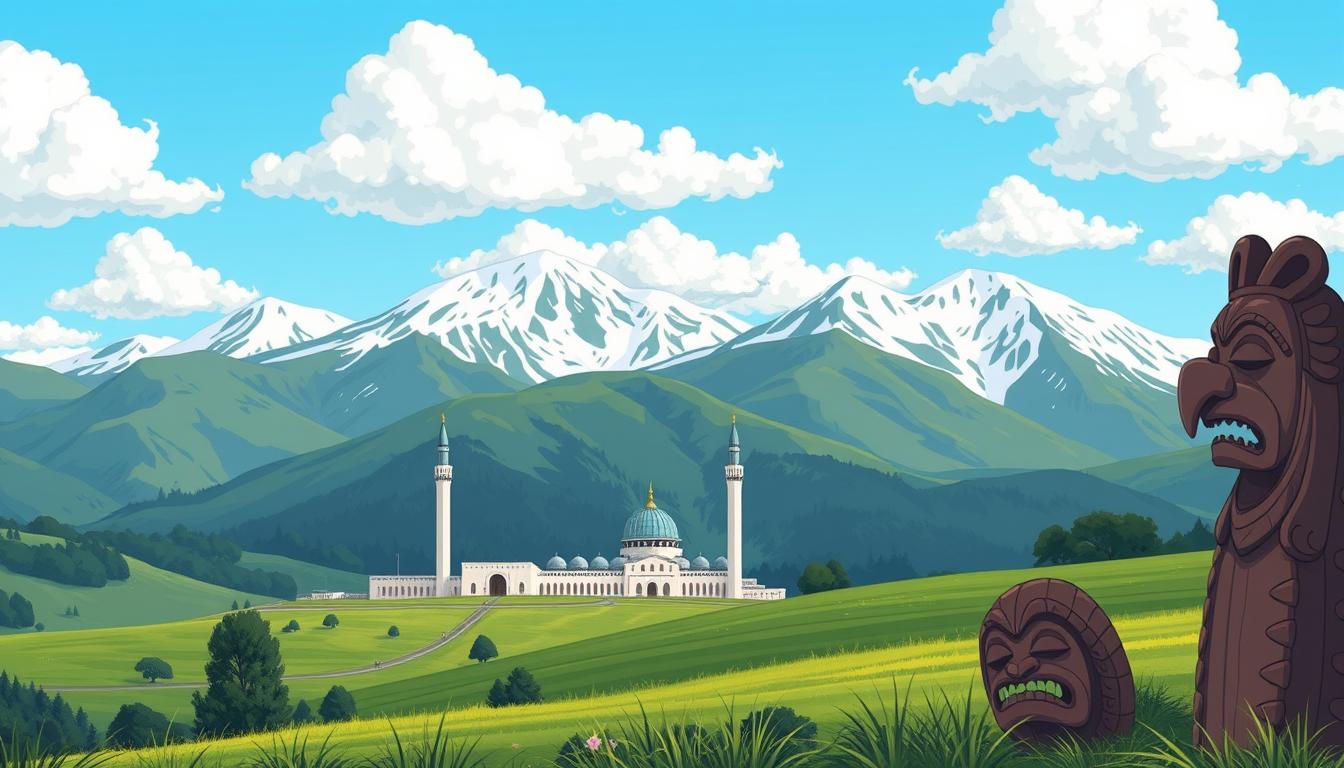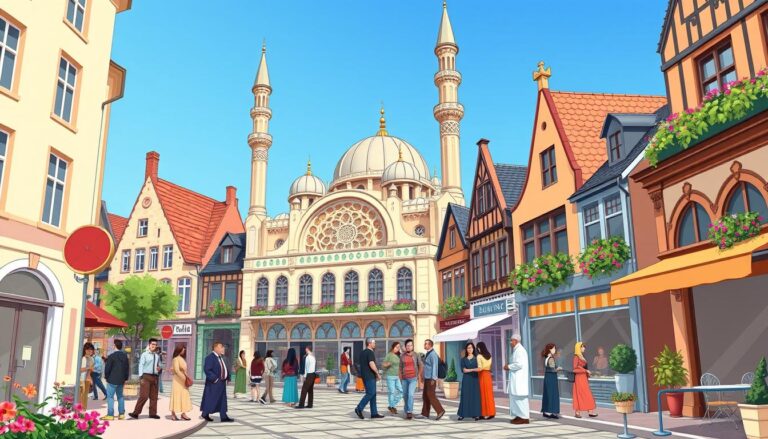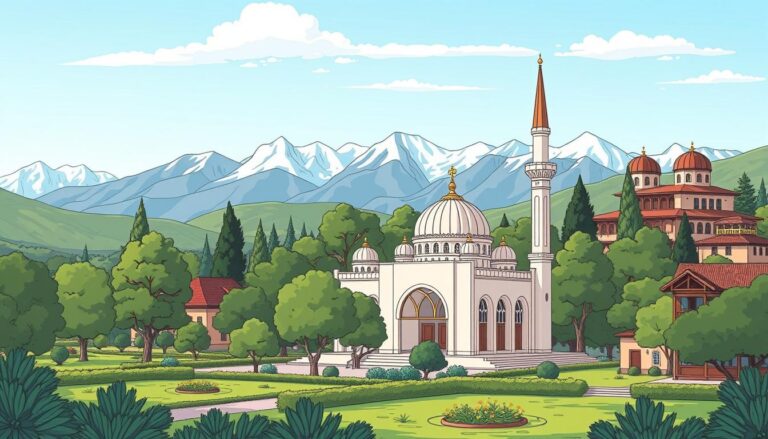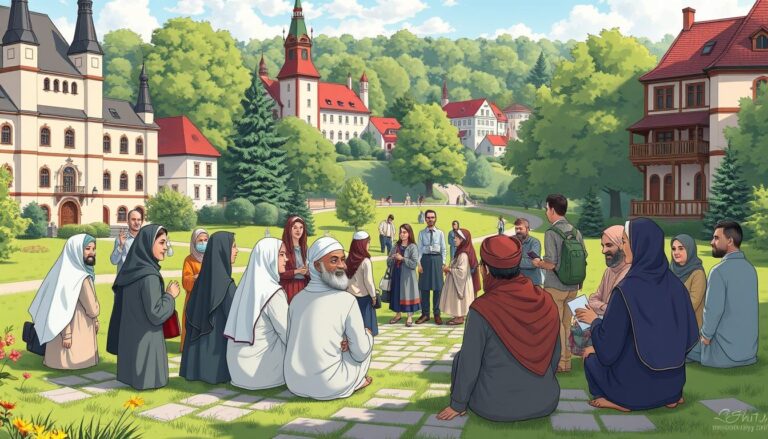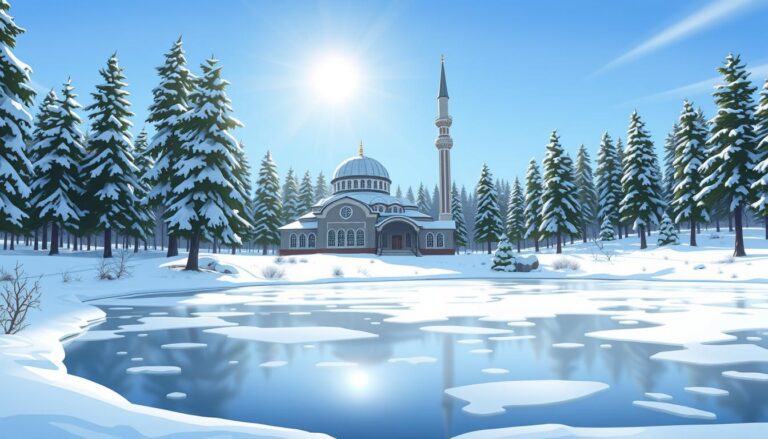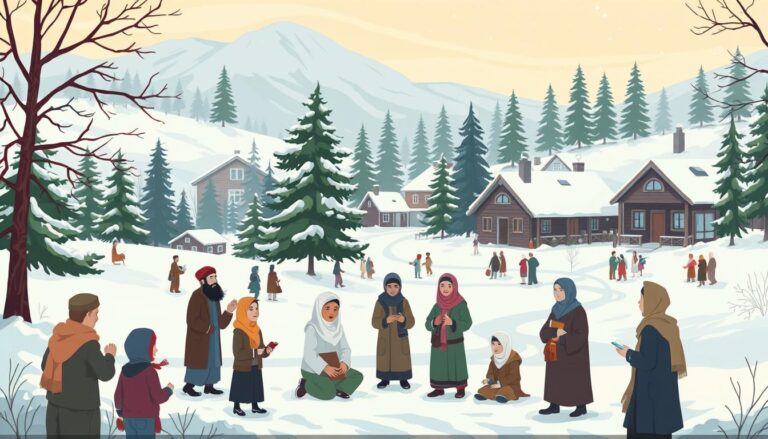Islam in New Zealand
Only 2% of New Zealanders surveyed expressed a reluctance to have a neighbor of a different religion, underscoring the country’s remarkable religious tolerance. Yet, the Muslim community in New Zealand, which currently makes up around 1% of the population, is projected to grow to 3% by 2050, reflecting the dynamic nature of the Islamic presence in the country. With a long history dating back to the late 19th century and a vibrant, ethnically diverse makeup, the Muslim community in New Zealand has become an integral part of the nation’s cultural fabric.
Key Takeaways
- Islam is the third-largest religion in New Zealand, representing around 1.3% of the total population.
- The earliest Muslim presence in New Zealand dates back to the late 19th century, with small numbers of immigrants from South Asia and Eastern Europe.
- Large-scale Muslim immigration began in the 1970s, with the arrival of Indian Fijians, followed by refugees from war-torn countries in the 1990s.
- New Zealand’s Muslim community is ethnically diverse, with significant populations from the Middle East, South Asia, and Southeast Asia, as well as a large Indo-Fijian Muslim community and a substantial Somali minority.
- The country’s religious tolerance is reflected in its low scores on the Government Restrictions Index and Social Hostilities Index, indicating minimal government restrictions and social hostilities involving religion.
Introduction to Islam in New Zealand
The history of Islam in New Zealand dates back to the late 19th century, with the country’s Muslim population steadily growing over the past century. The earliest Muslim settlers were an Indian family who made their home in Christchurch in the 1850s, followed by Chinese Muslim gold diggers working in the Otago region in the 1870s. Over the decades, Punjabi, Turkmen, and Gujarati immigrants also settled in the major centers of Auckland and Christchurch, establishing the foundations of the country’s Muslim community.
Early Muslim Presence in the 19th Century
The first recorded Muslim settlers in New Zealand arrived in the mid-19th century, with the Indian family in Christchurch representing the early Muslim presence in the country. This was followed by the arrival of Chinese Muslim gold diggers in the Otago region in the 1870s, further diversifying the history of Islam in New Zealand.
Growth of Muslim Population in Modern Times
Over the 20th century, New Zealand’s Muslim population continued to grow, with waves of immigrants from South and East Asia, as well as the Middle East, settling in the country. The Muslim population growth in New Zealand has been fueled by the arrival of Fiji Indian Muslims in the 1960s and 1970s, and more recently, the influx of refugees from countries like Somalia, Afghanistan, Iraq, and Syria.
Today, the New Zealand Muslim community represents around 1% of the country’s total population of 4.7 million, with approximately 40,000 members. While the community remains relatively small, it has become an integral part of the nation’s diverse cultural fabric, contributing to various aspects of society, from education and the workplace to sports and community activities.
Demographics of Muslims in New Zealand
New Zealand is home to a diverse and growing Muslim community. According to the 2018 census, there are at least 57,276 Muslim New Zealanders, representing around 1.3% of the total population. The majority of the Muslim population in New Zealand identifies as Sunni, with significant Shia and Ahmadiyya minorities.
The Muslim community in New Zealand is ethnically diverse, with significant populations from the Middle East, South Asia, and Southeast Asia. The largest proportions of New Zealand Muslims identify as Indian (29%) and as members of Middle Eastern groups (21%) like Arab, Iranian, and Iraqi. There is also a large Indo-Fijian Muslim community and a substantial Somali minority.
The largest concentrations of Muslims are in the major cities of Auckland, Hamilton, Wellington, and Christchurch, with two-thirds of the Muslim population residing in Auckland. The Muslim population in New Zealand has experienced rapid growth, increasing six-fold between 1991 and 2006, and is projected to surpass 100,000 by 2030.
Ethnic Diversity and Population Statistics
- Around 25% of Muslims in New Zealand were born within the country’s borders, with the majority being immigrants from South Asian origin such as Indians, Pakistanis, Bangladeshis, and Fiji-Indians.
- The Muslim population in New Zealand increased from 6,000 in 1991 to 57,276 by the late 1990s, and currently constitutes approximately 1% of the total population.
- Data reveals that Indian and Fijian Muslims in New Zealand have a low unemployment rate of around 7%, while Somali and Afghan Muslims experience unemployment rates of about 20%.
- Indonesian and Pakistani Muslims have relatively high employment levels, with only 10% unemployment among them, while unemployment rates for Iraqi, Iranian, and Malaysian Muslims in New Zealand are around 15%.
The diversity and growth of the Muslim population in New Zealand reflects the country’s increasing ethnic and religious pluralism, with a majority of respondents in a national survey agreeing that a society with different races, religions, and cultures is a good thing.
Māori Muslims
In New Zealand, there is a small but growing community of Māori Muslims. The Ahmadiyya Muslim Community has played a significant role in this, as they have translated the Quran into the Māori language, Te Reo Māori. This has attracted some Māori people to convert to Islam, drawn by its emphasis on social justice and community.
The Māori Muslim population has steadily increased over the years, from 99 individuals in 1991 to 1,116 in 2018. In 2006, they represented 0.19% of the overall Māori population. This growth, though modest, demonstrates the increasing interest in Islam among Māori people.
The translation of the Quran into Te Reo Māori was a significant undertaking, taking Mr. Shakil Ahmad Monir nearly twenty years to complete the first half. This effort has helped bridge the gap between Māori culture and Islamic teachings, making the faith more accessible to the indigenous people of New Zealand.
The connection between Māori culture and Islam has led to the organization of cultural events, such as the “National Māori Muslim Day” in 2003, which involved both the Canterbury Mosque and the Ngā Hau e Whā National Marae in Aranui. Additionally, the integration of Islamic and Māori practices has resulted in the creation of halal hāngī and ‘Matariki at the Mosque’ events.
The conversion to Islam among Māori people has had a positive impact on their wellbeing and sense of empowerment, with some finding peace and solace after previously being involved with gangs or in prisons. However, this topic remains largely overlooked, and more research is needed to understand the process of conversion and its effects on identity and belonging within the Māori community.
“The translation of the Quran into Te Reo Māori was a significant undertaking, taking Mr. Shakil Ahmad Monir nearly twenty years to complete the first half.”
Overall, the Māori Muslim community in New Zealand is a testament to the diversity and adaptability of Islam, as it continues to grow and integrate with the unique cultural traditions of the indigenous Māori people.
Religious Life and Institutions
New Zealand’s diverse religious landscape includes a significant Muslim community that has grown steadily over the past few decades. The country is home to several mosques and Islamic centers, particularly in the major cities, as well as two Islamic schools in Auckland – Al Madinah and Zayed College for Girls.
Mosques and Islamic Centers
The Federation of Islamic Associations of New Zealand (FIANZ) serves as the national umbrella organization representing the Muslim community, with seven affiliated regional associations. Other notable Muslim organizations in New Zealand include the predominantly Fijian Indian Anjuman Himayat al-Islam, the University of Otago’s Muslim Student Association (MUSA), the Ahmadiyya Jama’at New Zealand, and the Southland Muslim Association.
These mosques and Islamic centers in New Zealand provide the Muslim community with important Islamic institutions for religious practices, community gatherings, and educational programs. They play a vital role in maintaining the religious life and identity of Muslim organizations and associations throughout the country.
“The Muslim community in New Zealand is internally diverse, with individuals from various socio-economic and cultural backgrounds holding different understandings of Islam.”
This diversity is reflected in the range of Islamic institutions found across New Zealand, catering to the varied needs and beliefs of the Muslim population. As the Muslim organizations and associations continue to grow, they play an increasingly important role in shaping the religious life and identity of the Muslim community in New Zealand.
Islam in New Zealand
Islam has become an integral part of New Zealand’s diverse religious landscape, with the Muslim community playing an active role in the country’s social, cultural, and political spheres. While Muslims make up a small percentage of the overall population, they have established a strong presence through their religious institutions, community organizations, and participation in public life.
The Muslim community in New Zealand comprises individuals from over 80 countries, reflecting the global nature of the faith. The Islamic Women’s Council, for which Dr. Aliya Danzeisen is the national coordinator and spokesperson, is actively involved in preparing responses to inquiries such as the Royal Commission of Inquiry into the Christchurch mosque attacks. This highlights the Muslim community’s engagement in addressing issues of importance to both the Muslim and wider New Zealand population.
The role of Islam in New Zealand society is multifaceted, with notable figures like Sonny Bill Williams, a professional athlete who converted to Islam in 2008, serving as positive role models and contributing to the visibility of the faith. Sonny Bill Williams has played league, union, and sevens at the highest level in sports, and he has also won all seven of his heavyweight boxing fights, cementing his status as one of the most successful cross-code athletes.
Despite the relatively small size of the Muslim population, which constitutes around 1% of the total population, the community has faced challenges, such as gendered Islamophobia and suspicion in the aftermath of the 9/11 attacks and the War on Terrorism. However, the majority of New Zealanders (89%) agree that it is positive for society to be composed of different races, religions, and cultures, and 80% believe it is important to accept a wide variety of cultures in New Zealand.
As Islam continues to play a role in New Zealand’s diverse religious landscape, the Muslim community’s contributions to the country’s social, cultural, and political spheres will undoubtedly continue to shape the nation’s identity and values.
Cultural Acceptance and Integration
New Zealand is widely regarded as a culturally diverse and accepting nation, with the majority of the population endorsing a multicultural ideology. This openness extends to the integration of Muslim immigrants, who comprise the third-largest religious group in the country. However, research suggests that perceptions and attitudes towards this community can vary, with some immigrant groups being viewed more favorably than others.
According to the 2018 New Zealand census, there are at least 57,276 Muslim New Zealanders, representing approximately 1.3% of the total population. This Muslim community has grown significantly in recent decades, with large-scale immigration from India, Fiji, and various war-torn regions in the 1970s and 1990s. Despite this increasing diversity, the vast majority of New Zealanders maintain a positive attitude towards religious and cultural pluralism.
While there have been isolated incidents of hostility towards Muslims, New Zealand is generally considered to have relatively low levels of religious-based social hostilities. The New Zealand Journal of Asian Studies notes that the debate surrounding Muslim integration in the country is more nuanced, with questions arising about the practical implementation of multiculturalism and the alignment of moral intentions with legal requirements.
Perceptions and Attitudes Towards Muslim Immigrants
The research indicates that the perceptions and attitudes towards Muslim immigrants in New Zealand are complex and varied. On one hand, there is a prevailing attitude of ethnic and cultural tolerance, with the majority of the population embracing the country’s diversity. However, the sociological literature suggests that the debate surrounding multiculturalism in New Zealand is subject to criticism and skepticism, with no definitive answers on how to make it work in practical terms.
- 77% of New Zealand Muslims are overseas-born, with significant communities from India, the Middle East, and Southeast Asia.
- The Muslim population in New Zealand is the fastest-growing religious group, with 61% under the age of 15.
- Despite challenges of cultural exclusion and isolation, few voices promote a positive view of Muslim immigration in New Zealand.
As New Zealand continues to evolve as a multicultural society, the integration of Muslim immigrants and the cultural acceptance of this community remain important and complex issues that the country must navigate with sensitivity and understanding.
Government Policies and Regulations
New Zealand is widely regarded as a country that upholds religious freedom and has relatively low levels of government restrictions on religion. According to the Pew Research Center’s Government Restrictions Index, New Zealand scored just 0.48 out of 10 in 2016, indicating one of the lowest levels of government restrictions on religion in the world.
However, there have been some instances where government policies and regulations have raised concerns about the treatment of Muslim immigrants in the country. For example, in 2016, the leader of the New Zealand First Party made comments suggesting that certain immigrants should be screened for “unacceptable attitudes,” which raised concerns about religious freedom and the government’s approach to diversity.
Religious Freedom and Restrictions
Despite the overall low level of government restrictions on religion, there have been ongoing discussions and debates around the need for stronger regulations affecting Muslims in New Zealand. The royal commission of inquiry into the Christchurch attacks in 2019 recommended the toughening of responses to hate speech against minority groups, including Muslims, highlighting the gravity of the situation and the government’s efforts to address it.
However, the proposed government policies towards Muslims in New Zealand have faced criticism from some progressive and Islamic groups, who argue that the laws do not go far enough in providing broad-based protection for vulnerable communities, such as women, LGBTQI, and people with disabilities. The current religious freedom for Muslims in New Zealand is limited, as the existing hate speech laws only cover race, excluding gender, sexuality, and religion.
The government’s initial efforts to expand the scope of the hate speech laws to include gender, sexuality, and religion were later modified to focus solely on religious protections, leading to concerns about the adequacy of the proposed regulations. Further complicating the issue, the government recently decided to halt efforts on the hate speech laws to focus on economic priorities, indicating a shift in the political landscape and the government’s handling of these sensitive matters.
“The proposed hate speech laws were criticized for not providing broad enough protections to women, LGBTQI, and disability communities, suggesting a gap in the coverage of these vulnerable groups.”
Challenges and Incidents of Hostility
While New Zealand is generally considered a welcoming and tolerant country, the Muslim community has faced some concerning challenges and incidents of hostility. In 2016, the Whanganui branch of the Right Wing Resistance circulated pamphlets that accused Muslim refugees of intending to change the country’s culture, highlighting the presence of anti-immigrant sentiments. The 2019 Christchurch mosque attacks, in which 50 worshippers were tragically killed, was a shocking event that underscored the need for continued efforts to promote religious tolerance and community cohesion.
Hate crimes and hate speech targeting the Muslim community in New Zealand are also a pressing concern. According to research, there is a positive association between online hate speech and offline racially and religiously aggravated offenses. Hate speech can potentially escalate to hate crime, emphasizing the importance of addressing hateful rhetoric to prevent physical harm.
While New Zealand does not have specific hate crime laws, the Sentencing Act 2002 allows for hate motivation to be considered an aggravating factor during sentencing. However, the lack of hate crime data collection and the limitations of the Summary Offenses Act in effectively addressing hate-motivated offenses highlight the need for a more comprehensive approach to addressing challenges facing the Muslim community in New Zealand.
- Incidents of hostility towards Muslims in New Zealand, including verbal and physical abuse, have been reported by the community.
- The 2019 Christchurch mosque attacks were a tragic reminder of the need for continued efforts to promote religious tolerance and community cohesion.
- Hate speech and hate crimes targeting the Muslim community are a concern, with research suggesting a link between online hate speech and offline racially and religiously aggravated offenses.
- New Zealand’s current legislative approach to hate crimes could be improved by establishing hate crime offenses and enhancing data collection on hate-motivated incidents.
“The Jewish community in the country was experiencing ‘unprecedented levels of antisemitic abuse.'”
It is crucial that New Zealand continues to address the challenges facing the Muslim community and other minority religious groups, ensuring that all individuals are able to practice their faith freely and without fear of hostility or discrimination.
Conclusion
Islam has established a growing presence in New Zealand, with the Muslim community now comprising around 1.3% of the country’s total population. This diverse religious group includes significant populations from the Middle East, South Asia, Southeast Asia, as well as a large Indo-Fijian Muslim community and a substantial Somali minority. While New Zealanders generally embrace religious and cultural diversity, the Muslim community has faced some challenges and isolated incidents of hostility over the years.
Despite these obstacles, Islam has become an integral part of New Zealand’s religious landscape, with the Muslim community playing an active role in the country’s social, cultural, and political spheres. The community’s efforts towards coordination at a national level, such as the formation of the Federation of Islamic Associations of New Zealand (FIANZ) in 1979, have helped to strengthen its voice and influence within the broader society.
The steady growth of the Muslim population in New Zealand, both in terms of numbers and relative proportion, reflects the community’s ongoing integration and acceptance within the country. As the religious diversity of New Zealand continues to evolve, the role and impact of Islam in the country’s cultural and social fabric is likely to grow in significance in the years to come.
Source Links
- 4 facts about religion in New Zealand
- Life in New Zealand as a Muslim
- Microsoft Word – 3Introduction2.doc
- New Zealand has been a home to Muslims for centuries, and will remain so
- Muslims in New Zealand | Te Pae Rangahau Tauhōkai Ahurea / Centre for Applied Cross-cultural Research | Te Herenga Waka—Victoria University of Wellington
- New Zealand Muslims – İnsamer – İnsamer
- Māori Muslims
- What is Islam’s appeal to Māori?
- Building unity in New Zealand a year after Christchurch attacks
- New Zealand – Religion
- Microsoft Word – 4Shepard2.doc
- Microsoft Word – 6Clarke2.doc
- ‘The Muslim community is the super-diverse community inside the super-diverse nation’
- Sonny Bill Williams: ‘We’ve been taught to be embarrassed of Islam’ | CNN
- Islam in New Zealand
- Microsoft Word – 5Kolig2.doc
- A qualitative analysis of Muslim young adults’ adaptation experiences in New Zealand
- New Zealand government under fire after shelving Christchurch hate speech reforms
- Rolling Back Government: Lessons from New Zealand
- Hate crime and hate speech
- New Zealand – United States Department of State
- Muslim identity and experiences in New Zealand – Expert Reaction
- American Journal of Islam and Society.indb

